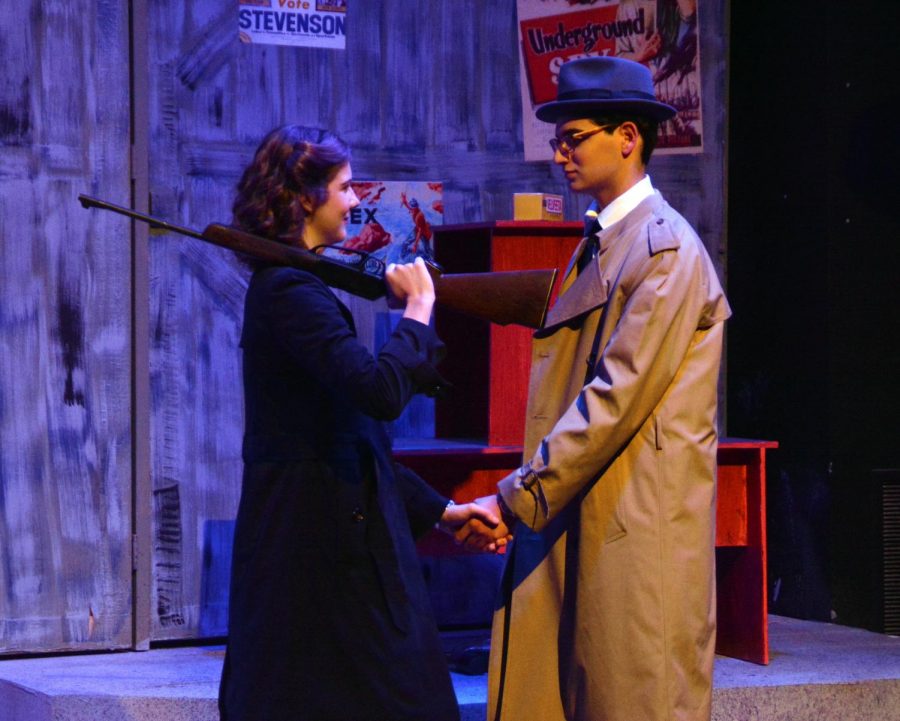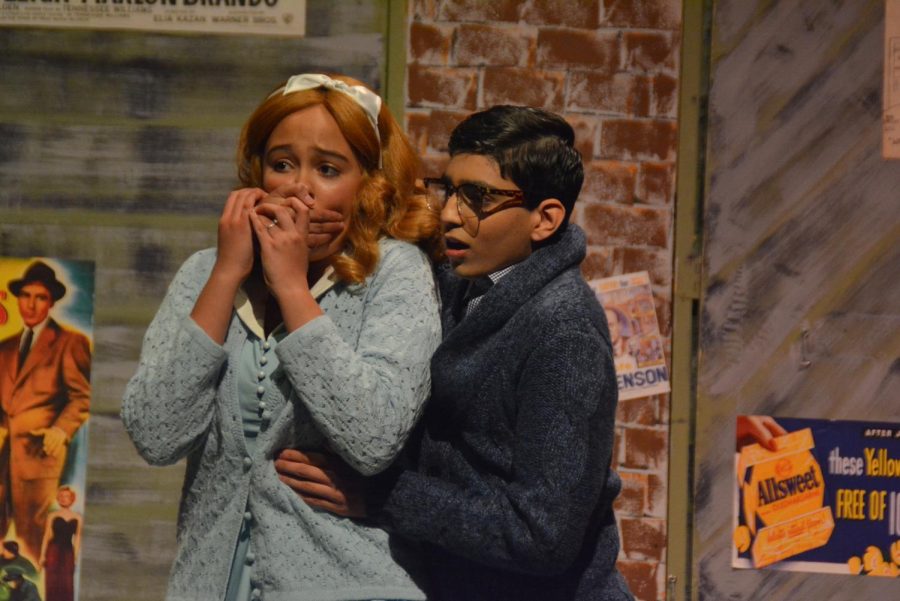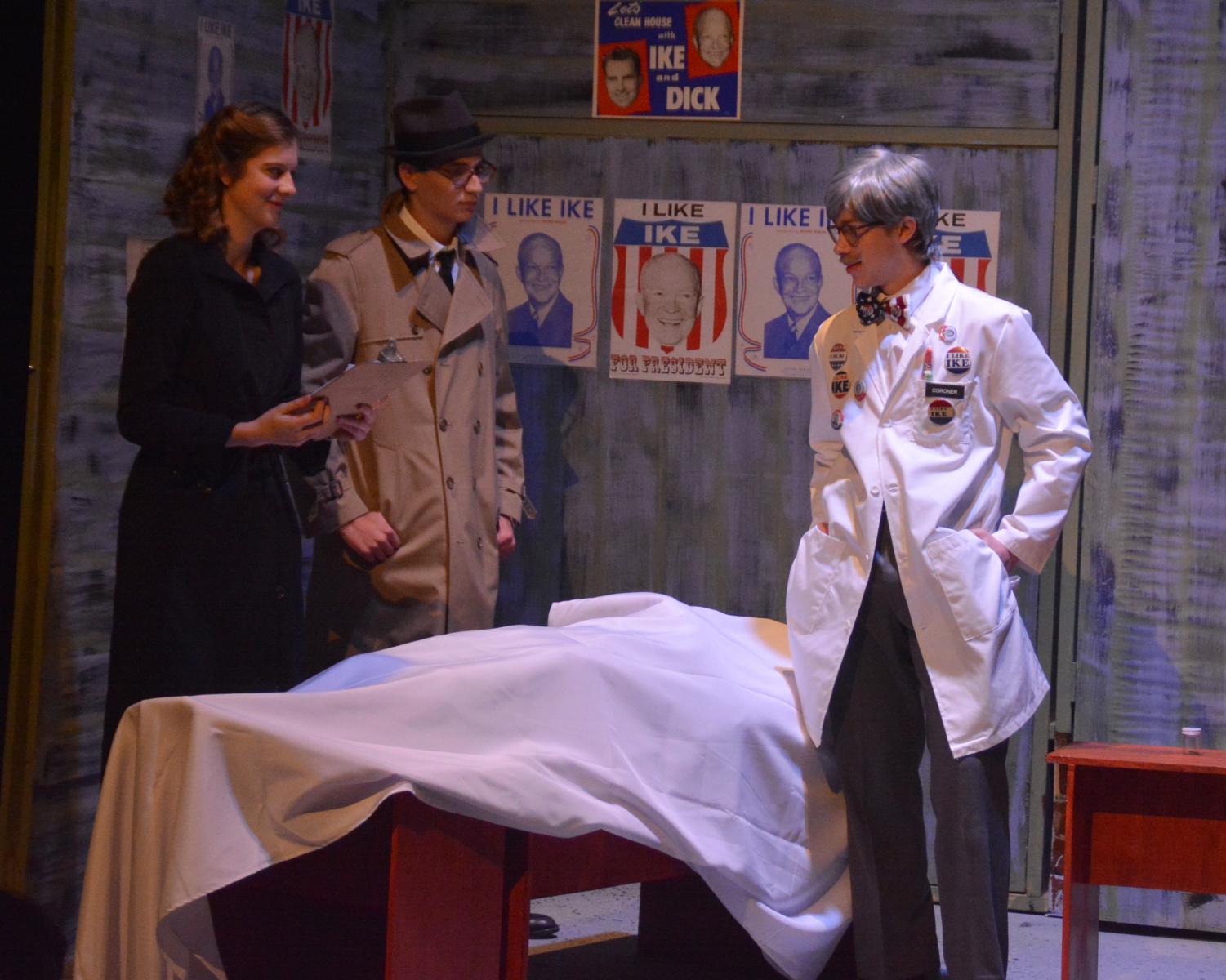“Red Herring” explores love stories, murder mystery
February 12, 2019
Detective Maggie Pelletier (played by junior Sacha Waters) kneels over the body bag, examining the corpse within. “I Like Ike” and Red Scare-era posters plaster the wall behind her, setting the stage for the 1950s mystery of “Red Herring.”
On Jan. 30 and Jan. 31, “Red Herring,” a play written by Michael Hollinger and directed by Jamie Stires-Hardin, was put on in the Black Box Theatre. “Red Herring” revolves around three intersecting love stories. The events occur in the midst of the Second Red Scare, a period of widespread hysteria regarding foreign communists infiltrating the U.S. Government. Waters described the play as “a convergence of a Cold War comedy and a film noir mystery that amounts to something hilarious yet touching.”
Waters played Maggie Pelletier, a headstrong, tough-as-nails Boston detective who has been pursuing a serial killer for the last seven years. She acquires a lead when a fisherman finds an apparently drowned body in the Boston Pier. Maggie grapples with balancing her demanding case and her romantic relationship with Frank Keller, a lovelorn FBI agent attempting to capture a Soviet spy who desires to wed Maggie.
“She has a lot of internal struggles throughout the play,” Waters said. “Her character arc is so interesting, and she develops tremendously throughout just that one week [during which the play occurs]. As an actress, it’s been great to explore her passions and flaws and be able to play such a wonderful character”.
Maggie’s role as a strong female lead also appealed to Waters since it is a role most often played by males.
“What I love about Maggie is that she’s this conventional detective trope,” Waters said. “Hollinger has taken that sort of character aesthetic that’s usually a man and instead made it into a women. That’s really nice and subversive to me.”

Detective Maggie Pelletier (played by Sacha Waters) and FBI Agent Frank Keller (played by Eli Maierson) perform a Quaker marriage.
As she learned to embody Maggie’s strong-willed personality and “understand her internal demons,” Waters gradually felt a special bond to her character.
“I connect with her a lot of a personal level,” Waters said. “Mrs. Stires-Hardin said that I grew to have a little bit of Maggie in me—a bit of a willful, film noir detective—and that’s probably the best compliment I’ve ever been given.”
The second love story of “Red Herring” focuses on the relationship between Lynn McCarthy, (played by sophmore Noura Jabir), daughter of the notorious red-baiting Senator Joseph McCarthy, and her fiance James Appel, (played by senior Sebastian Varma), a physicist and Soviet Spy embroiled in a nuclear espionage plot. Despite her father’s views, a combination of Lynn’s naive but well-intentioned demeanor and vigorous love for her fiance leads her to help James carry out the final part of his mission for the Russian government.
The third plotline concentrates on Mrs. Kravitz, (played by junior Louisa Sarofim), a hard-boiled landlord who murdered her husband to pursue her amorous relationship with Russian fisherman Andrei Borschevsky (played by junior Alexander Adrogué), whose wife is trapped in a Soviet gulag.
According to Sarofim, Mrs. Kravitz’s complex characterization was a stark difference to previous characters she had played. Sarofim described having to focus on “aggressive hand gestures” and “deliberately avoiding eye contact” to convey her character’s personality and state of mind.
“I had never played someone who was so grumpy and curmudgeonly but also so overtly flirtatious,” Sarofim said. “It was a lot of work—both the way I moved physically and how I delivered my lines—to conjure up that anger and fear she felt and have that coincide with her loving and caring alter-ego.”

Lynn McCarthy (Noura Jabir) finds out her fiance James Appel (Sebastian Varma) is Soviet Spy embroiled in a nuclear espionage plot.
“Red Herring” appealed to director Jamie Stires-Hardin through its charming amalgam of mystery, historical and comedic elements.
“We want[ed] to choose a play that will best bring out the artistic talent in our students and challenge them,” Stires-Hardin said. “‘Red Herring’ is a very challenging play in that getting that comedic timing correct requires a massive collaborative effort between the cast. Also, it was simply a very funny, very interesting play that I found spoke to our time right now.”
Stires-Hardin also emphasized the importance of diversity and proper representation of the St. John’s theater community in the plays they put on.
“It’s been a conscious decision choosing more contemporary plays these past few years for that strong female representation,” Stires-Hardin said. “I think you can see that common theme with Maggie in ‘Red Herring,’ Grace in ‘Bus Stop’ and the protagonists of ‘9 to 5.’ All of our actresses are strong females, so they deserve to play strong females.”



